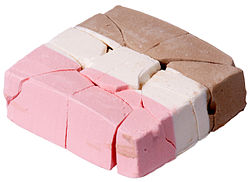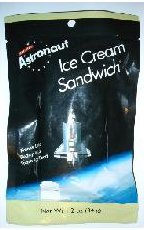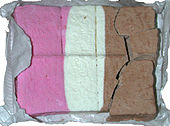Freeze-dried ice cream
 Freeze-dried Neapolitan ice cream | |
| Type | Ice cream |
|---|---|
| Created by | Whirlpool Corporation |


Freeze-dried ice cream, also called astronaut ice cream or space ice cream, is ice cream that has had most of the water removed from it by a freeze-drying process. Compared to regular ice cream, it can be kept at room temperature without melting, is dry and more brittle and rigid, but still soft when bitten into. It was developed by Whirlpool Corporation under contract to NASA for the Apollo missions.[1][2] However, it was not used on any Apollo mission. Freeze-dried foods were developed so that foods could be sent on long-duration spaceflights (e.g. to the Moon), and to reduce the weight of the water and oxygen (which both play a significant role in food deterioration[1]) normally found in food. The process of freeze-drying also eliminates the possibility of food melting and spilling as liquid in zero-gravity, which would be problematic.[1][3]
Freeze drying (or lyophilization) removes water from the ice cream by lowering the air pressure to a point where ice sublimates directly from a solid to a gas. The ice cream is first placed in a vacuum chamber and frozen until any remaining water crystallizes. The air pressure is then lowered below water's triple point, creating a partial vacuum, forcing air out of the chamber; next heat is applied, sublimating the ice; finally a freezing coil traps and turns the vaporized water into ice. This process continues for hours, resulting in a freeze-dried ice cream slice.[2]
Freeze-dried ice cream is sold by mail order and is common in science museums and NASA visitor center gift shops, sometimes accompanied by other freeze-dried foods.
Space use[edit]
Freeze-dried foods were initially developed for the Mercury missions.[4] Despite use of images of space-walking astronauts in space suits on product packaging, freeze-dried ice cream was not included on any mission in which space suits were used. The only evidence for freeze-dried ice cream ever having flown in space is the menu for the Apollo 7 mission, on which is it listed for one of the meals.[5] However when the only surviving member of Apollo 7 was asked, he did not remember it being served on the flight.[6][7]
According to one NASA food scientist, although freeze-dried ice cream was developed on request, "it wasn't that popular."[8] Astronaut Mike Massimino expressed dislike of freeze-dried ice cream, calling it "disgusting" and "more closely related to a building material than a food".[9]
Traditional ice cream in space[edit]
During the 1970s, astronauts ate regular ice cream on the Skylab space station and regular ice cream has also been eaten on the International Space Station.[10] Skylab had a freezer that was used for regular ice cream,[11] and occasionally Space Shuttle and International Space Station astronauts have also taken regular ice cream into the space station.[12]
Public consumption[edit]
In 1973, the visitor center at the Ames Research Center in California began researching how to allow visitors to taste astronaut food. They contacted American Outdoor Products and Backpacker's Pantry, the latter becoming a known source for freeze-dried meals like stews and even pasta dishes for serious campers and backpackers.[13] NASA/AMES worked with American Outdoor Products to produce the world first freeze-dried ice cream and Astronaut Foods with the goal to allow people to see what space food tastes like.[14]
See also[edit]
References[edit]
- ^ a b c "Space Food" (PDF). NASA. Archived from the original (PDF) on 2006-10-13. Retrieved 2007-06-07. The license is now not held by Action Products International, Inc.
- ^ a b "Astronaut Ice Cream". Archived from the original on January 27, 2011.
- ^ "Former NASA Astronaut Explains How Food Is Different in Space | WIRED". Youtube. WIRED Magazine. 16 July 2019.
- ^ "Food in Space | National Air and Space Museum". airandspace.si.edu. Archived from the original on 2020-06-10. Retrieved 2020-07-09.
- ^ "Apollo 7 press kit" (PDF). Nasa. 1968-09-27. Retrieved 2022-08-04.
- ^ Lampen, Claire (2019-07-17). "A Brief History Of Failed Space Snack Astronaut Ice Cream, Created For The Apollo Missions". Gothamist. Retrieved 2022-08-04.
- ^ "The Aborted Launch and Meteoric Rise of Astronaut Ice Cream". Narratively. 2014-08-08. Retrieved 2022-08-04.
- ^ "A Holiday Dinner in Space". NASA. December 15, 2005. Archived from the original on 2010-03-19. Retrieved 2009-08-13.
- ^ "Former NASA Astronaut Explains How Food Is Different in Space | WIRED". Youtube. WIRED Magazine. 16 July 2019.
- ^ "Space Today Online: Astronauts Eat in Orbit". www.spacetoday.org.
- ^ "History of Food in Space". NASA. Archived from the original on 2007-05-26. Retrieved 2007-06-07.
- ^ "Orbital Ice Cream, Atlantis' ISS Surprise". LiveScience.com. 2006-09-16. Retrieved 2007-06-07.
- ^ "Freeze-Dried Foods Nourish Adventurers and the Imagination | NASA Spinoff". spinoff.nasa.gov. Retrieved 2023-07-11.
- ^ "The History of Astronaut Ice Cream". Serious Eats.
